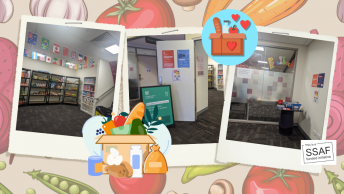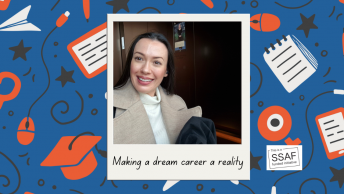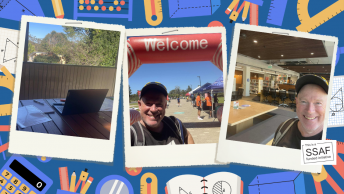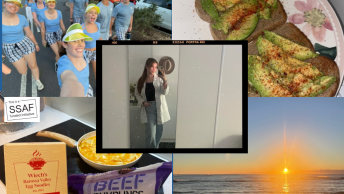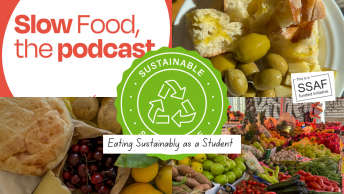Written by Catherine Mallia
I started my first undergraduate degree over 15 years ago. Back in a time where ‘online’ was for fancy people, and handwritten notes and libraries were the only option to get information. Life of online learning changed the way we think, learn, and experience education. It’s likely many of us couldn’t fulfil our learning goals without it. We can now fit education around normal life, but managing the distractions and overwhelm has become the new challenge. So, what have I learned from over a decade of being a student? Here are some key strategies I’ve developed to merge studying into everyday life. I hope they’re helpful.
Boredom is the thief of joy
Somewhere along our history timeline, education went from something one was privileged to have, to something one endured. I don’t know the details of that history, but learning should be awesome! It should awaken ideas and thought processes reserved for the chatter amongst those learning the same thing and the experts who are teaching us. It should spark curiosity and problem-solving. It should bring out questions you never knew you had.
If you’ve found yourself going through the motions and just ticking off your to-do list, I would guess that learning has become mundane and a chore for you, and maybe you’re not enjoying it so much? How much better would it be to find the fun in it? Read one of the prescribed readings and let your mind run wild with it – what was cool about it? How does it tie into your real world? When could you use this in conversation? What does it mean for the world you live in? What else do you want to know about it?

Treat assignments like things you can use in your job, and exams like just showing what you know. This shift in thinking turns studying into inquiry and turns chores into fun. Anyway, you’ve seen Mary Poppins and heard the song, a spoonful of sugar etcetera.
Motivation waxes and wanes
You can’t sustain the enthusiasm all the time, you’ll burn out. Sometimes it’s ok to have that sleep in or weekend off. Rebuild, take time out, get organised and start again. Just don’t disappear. I’ve learned lecturers (and peers in your group work assignments) are very tolerant of life getting in the way. Much better to let them know you’ve fallen behind and ask for help, rather than assuming everyone else is on track and it’s just you struggling. I’ve seen too many students disappear and fail over something that could have been solvable.
Learning shouldn’t take a back seat to everything else
Don’t squeeze it in and put it last, I’ve done that way too many times and it causes so much stress. We feel guilty because our job earns an income, and family won’t wait, and studying is something we pay for, so it comes last. Switching this thinking to studying being the thing that will help you excel in your career, and benefits your work and home life, allows you to dedicate the time it needs to engage in the material better.
But also, shouldn’t stop you from living
Hobbies, friends, family, work all need to fit in there somewhere. It’s ok to keep your head down during assignment or exam time, just make sure you come up for air when it settles again.
Learning is a puzzle, and so is life
You won’t have all the answers right away, but every step fills in the gaps a little more. Countless times I thought, I don’t get it! Then I realised I don’t have to right now. Every subject builds on the next. Every experience adds to the last. One day it all falls into place. Sometimes you won’t fully understand something until you’re using it in practice. Doesn’t mean you’re not good at it or should give up easily, just lock it away in your memory and it will come back in the real world.

You can study with kids
This was the biggest myth I had to overcome. I thought I had to finish everything before kids because life would stop once I had them. Parents face an unusual kind of guilt; the guilt of doing nothing while having kids, and the guilt of doing anything while having kids. I figure it’s just one of those bizarre social constructs that hold no weight. Sure, you have to split and prioritise your time, but I’ve come to understand parents are exceptionally good at this. It’s not easy. If you can, get your kids involved in your learning. My daughter once proudly announced to her doctor when she was sick at 5 years old, that her macrophages were working hard at getting her better.
This isn’t for everyone though, and that’s ok. Kids are different, parents are different. Parents have enough to worry about without the guilt of ‘not studying hard enough’ or not managing their time better. If it’s too much for your circumstances, then it’s too much. The kids will grow up eventually and higher education isn’t going anywhere so focus on what you need to do and drop the expectations or guilt of needing to do anything differently.
You can change your mind on what you love, and probably will, many times
Ask my PhD supervisors! I’ve changed angles and ideas and questions so many times, and it’s all part of getting to the heart of what you’re really passionate about. My last meeting with my supervisors went something like…
Me: OK! I think I’m finally happy with this project! I’m not going to change it again!
Supervisor (laughing): Can we get that in writing?
It’s not only been in my PhD though. I started with an undergraduate in health science, but it only ignited my interest in cell biology, so I went onto a graduate certificate in science, which triggered an interest in biochemistry, so I went into a master of applied science, which started my questions on the use of animals in science, that led to my Phd, and kicked off my interest in animal welfare, so I went into environmental science, wildlife biology and conservation, which re-awoke my interest in science communication, and now I write for here and other places. I’m certainly not finished, so the unfolding of interests and ideas keeps taking me to new places, and having new ideas, and keeps life moving and exciting. I used to panic that I had no direction and found it all overwhelming. Now I realise my lack of direction has led to a semi-constructed direction, and accepted it will probably keep changing. Don’t worry about having it all figured out, things unfold in unpredictable ways, be willing to go with the flow, and then taking the wheel when you see a clear direction you want to follow.
Don’t give up
Study + life + work is hard! The reward at the end is addictive. You know you’ve pushed through the challenges, you know you’ve thought of giving up so many times and haven’t. The resilience you’ve practiced just to get through each semester is an invaluable skill. When you get to the end you’ll remember the struggle, but you’ll know you pushed through and did it anyway. How cool is that?
Or do give up
Counter intuitive I know, but it’s ok to realise it’s not your passion. It’s ok to recognise that the challenges outside of study need too much of your time and your heart just isn’t it. It’s ok to prioritise your mental health, your family, your other goals. Life loves throwing us hurdles, and it’s ok to just jump as many as you can before you say, nah, too tired for this last one, I’m out.
Studying doesn’t have to be separate to life, it should be part of it, and the skills you learn throughout your degree will help you in ways you probably haven’t even thought of yet. Enjoy the adventure.



